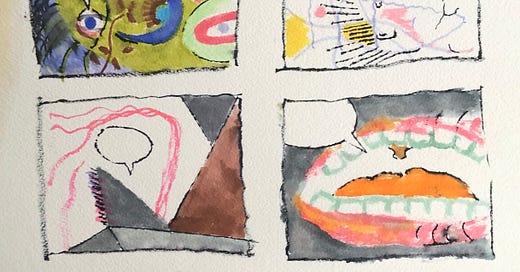24 hours after my move to substack.
So far, my move to a pay-site has been interesting. Mainly the response has been good. Overwhelming actually.
One old blog reader was unhappy. “I don’t pay friends or acquaintances for their opinions.”
I wanted to be snarky and ask if that meant she only paid strangers for their opinions. But I shared that snark only with Anne.
And now you.
I told my unhappy reader that she’s welcome to continue to subscribe for free but she will receive a limited product. That’s how it works.
It’s clear I won’t get rich off of this and I may just donate the money to a cause. But you’re here so you must think it’s worth something.
Learning about pensions and private equity.
For years as an active teacher, when it came to pensions I was laser focused on preserving them from cuts by the politicians.
Democrats in Illinois’s legislature were laser focused on cutting them, particularly the cost of living increases that retirees would receive every year.
In May of 2015 the Illinois Supreme Court struck down the state's landmark 2013 pension reform law, upholding a lower court ruling that it violated the state constitution.
In the ruling, the court rejected the state's defense that its contractual obligations were not absolute, because it reserved "police powers" in a time of crisis.
The court was unanimous in its ruling that the language of the Illinois Constitution was clear. Our retiree benefits could not be diminished or impaired.
Before the court’s ruling and before their historic decision I never sat down and calculated what it would have cost me if we lost. Once the court ruled I opened my phone’s calculator to figure it out.
I discovered that it would have cost me tens of thousands of dollars and we would have had to change all of our retirement plans.
So would all other public workers in the state of Illinois.
By the time of the court’s ruling, even though I was a K-5 Art teacher, I along with other teacher pension fighters had become a version of the jail house lawyer.
I knew pension law.
On many occasions I found myself on stage with lawyers and legislators and could quote them chapter and verse on what the law said and what was the obligation of the state.
Now, even six years after the ruling by the court, our public pensions still face threats.
One of the biggest threats comes from the reliance of the Teacher Retirement System on private equity for our investments.
While the court has ruled that the constitution and contract require payments to retirees, there is no similar legal requirement that the state meet its obligation to adequately fund the state’s public pensions systems.
For decades the state has failed to meet those obligations. They have run up a nearly $150 billion debt.
25% of the state’s budget goes to paying that debt.
Only 20 cents on the dollar of that goes to pay public worker retirees our retirement benefit. The rest goes to service the debt.
This is where private equity companies come in.
All across the country public pensions are facing underfunding. Few are as underfunded as Illinois. But since investment returns are a source of pension funding, the investments in high-risk, alternative investment schemes which promise larger returns are eating up a larger and larger share of our investments.
In Illinois 15% of our investments are with private equity.
There are lots of problems with this.
So now I have to learn about private equity.
Feel free to share all posts and subscribe if you would like.





And what did Anne say?